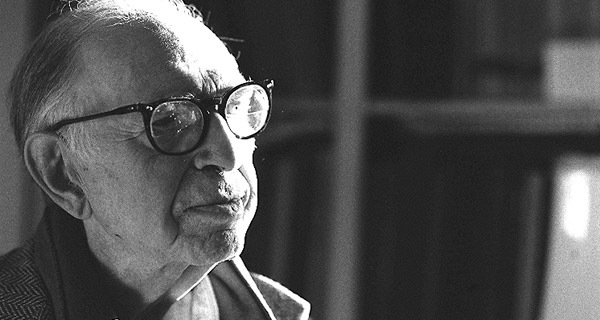
March 15, 2016
Hugo Weisgall’s earliest memory involved singing in a synagogue choir on Yom Kippur. He was three years old. His father—a cantor—was at war. His aunt and uncle had just received word that their son was missing in action. His aunt would never leave the house again. Within a few years, Weisgall would emigrate from what is now the Czech Republic to start a new life in the U.S. But that powerful earliest memory encapsulates and symbolizes a life in music preoccupied with Jewish allegory and a predilection for high drama—qualities amply evident on the Milken Archive’s 2004 CD, Hugo Weisgall.
The album opens with T’kiatot: Rituals for Rosh Hashana, one of Weisgall’s strongest musical statements of Judaic substance and a rare foray into instrumental music. Though sonically the music reflects the composer’s affinity for 20th-century musical aesthetics, its framing structural components are its incorporation of the shofar (ritual ram’s horn) and a medieval Ashkenazi prayer tune. The shofar blasts here serve, much as they do in their sacred context, as punctuating elements, or a call to spiritual awakening—although within the context of the music’s dense and craggy texture the blasts have a somewhat counterintuitive calming effect.
| STREAM IT NOW |
|

|
|
| OWN THIS ALBUM |
|


|
|
| LEARN MORE |
|

|
|
Composed just five years before his death, Psalm of the Distant Dove was Weisgall’s last song cycle. With a text that combines verses from the Song of Songs and rabbinic commentaries with medieval-era poetry from the “golden age” of Jewish life on the Iberian Peninsula, the underlying narrative is the complex relationship between God and the people Israel. Four Choral Etudes comprises four settings of liturgical texts composed over a span of more than 20 years. Deeply expressive, with intricate harmonies and dynamics, they have the flavor of a contemporary madrigal but a technical complexity apropos of their designation as etudes (studies).
The closing cantata, A Garden Eastward, is a setting of medieval poetry by the great Spanish Hebrew poet and philosopher Moses ben Jacob Ibn Ezra. It’s an appropriate way to end the album, as it combines the composer’s masterful skill at composition and orchestration, his deep love of poetry, and his proficiency at amplifying the poetry’s inherent drama.
Related Content from the Milken Archive and Beyond
| Reflection |
 |
Hugo Weisgall recalls life in Moravia and immigrating to America.
|
|
| Revelry |
 |
Begin your Purim celebrations early with this Purim Playlist from our Spotify channel. Listen now.
|
|
| Rebirth |
 |
Success of City Opera’s 2009 revival of Weisgall’s “Esther” defied the odds.
|
|







